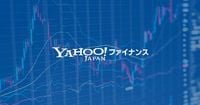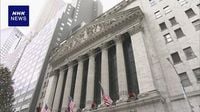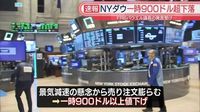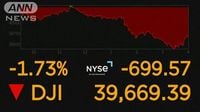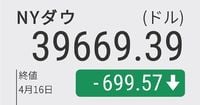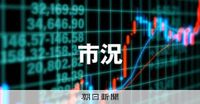On April 16, 2025, the New York stock market experienced a significant downturn, with the Dow Jones Industrial Average plummeting by 699.57 points, closing at 39,669.39 dollars. This decline marked a critical moment as the index dipped below the 40,000 dollar threshold for the first time in four trading days. The sharp drop was largely attributed to comments made by Federal Reserve (FRB) Chairman Jerome Powell, who expressed a cautious outlook regarding potential interest rate cuts amid rising economic uncertainty.
During a speech on the same day, Powell highlighted the significant impact of the Trump administration's tariff policies on the economy, stating, "The impact of the Trump administration's tariff measures on the economy will exceed expectations." This statement raised alarms among investors, leading to heightened concerns about a possible economic slowdown. As a result, sell orders surged, causing the Dow to briefly fall by over 900 dollars at one point during the trading session.
The ramifications of Powell's remarks were felt across various sectors, particularly in high-tech stocks. Semiconductor giant Nvidia announced on April 15 that it would incur losses of up to 5.5 billion dollars in its February to April earnings due to new U.S. export regulations affecting its products designed for China. Following this announcement, Nvidia's stock price dropped by 6.87%, contributing to the overall decline in tech stocks, which are often seen as barometers of market health.
In addition to Nvidia, other major tech companies, including Apple and Microsoft, also saw their stock prices fall. The broader S&P 500 index fell by 2.24%, while the Nasdaq Composite, heavily weighted with tech stocks, dropped by 3.07%. The Philadelphia Semiconductor Index (SOX), which tracks major semiconductor stocks, experienced a nearly 4% decline.
As the market reacted to Powell's cautious stance, the foreign exchange market also saw notable movements. The yen strengthened against the dollar, reaching a temporary exchange rate of 1 dollar to 141 yen, marking the highest level for the yen in approximately six and a half months. This shift was fueled by investors seeking to sell dollars and buy yen, driven by concerns over the interest rate differential between the U.S. and Japan.
Market analysts noted that Powell's comments were particularly impactful given the backdrop of rising inflation and economic uncertainty. "Some investors were expecting an early interest rate cut due to concerns about an economic slowdown in the United States, but stock prices fell sharply due to Chairman Powell's remarks," said a market source.
Despite the grim outlook, some positive economic indicators were reported. The U.S. retail sales for March showed a 1.4% increase compared to the previous month, surpassing market expectations of a 1.2% increase. Factors contributing to this growth included a surge in consumer spending ahead of potential tariff increases and favorable weather conditions.
However, the overall sentiment in the market remained cautious. Investors were wary of a potential slowdown in consumer spending, which could further impact stock prices. The mixed signals from the economic data and Powell's cautious remarks left many investors uncertain about the future direction of the market.
In summary, the events of April 16, 2025, highlighted the fragility of the current economic climate. With Powell's cautious stance on interest rate cuts and the significant impact of tariff policies, investors are left grappling with the potential for an economic slowdown. The volatility in the stock market serves as a reminder of the interconnectedness of global economies and the influence of policy decisions on market performance.
